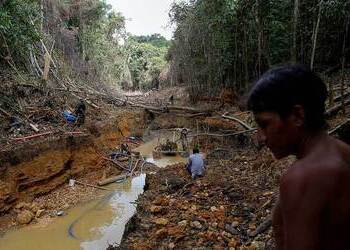|
Getting your Trinity Audio player ready…
|
As Zimbabwe Environmental Law Association (ZELA) joins the world in commemorating the 16 Days of Activism against Gender-Based Violence (GBV), it expressed concern over the increase in the vice within the artisanal and small-scale mining (ASM) sector.
The annual campaign begins on 25 November and runs through International Human Rights Day on 10 December.
ZELA subscribes to gender equality and condemns GBV in all its various forms. One in three women experiences GBV during their lifetime.
The violence has serious consequences, including immediate injury and possible long-term physical and psychosocial harm, as well as social and economic consequences or even death. The indirect negative impacts include increased poverty which creates a cycle of underdevelopment.
The protection and safety of women and girls can be achieved only through coordinated, and sustained action. Only through effective coordination can we bridge any gaps, address persistent challenges, and make progress towards reducing and preventing GBV.
“It is worth highlighting that the artisanal and small-scale mining (ASM) sector has also become synonymous with GBV which can take many forms. As ZELA points out in its Analysis on how the existing policies and laws impact the empowerment and security of women in the mining sector, the mining industry is often portrayed as being inherently violent and the mining sites as particularly hostile and unsafe environments for women. The “hyper-masculine” culture associated with ASM sites has been found to promote delinquent behavior while rejecting the norms and regulations of society.
“This violence is sometimes underpinned by negative gender norms, including rigid and culturally ascribed norms of masculinity and patriarchy that do not tolerate women as actors in public spaces, as well as norms that normalize GBV as a way for men to wield power over women. These standards deepen the plight of women in the absence of strong laws and ASM-specific GBV policies to protect them. This, therefore, calls for action. Although laws have been passed at the international and national levels, they sometimes do not always achieve the intended goals,” ZELA said in a statement.
The vast majority of women in mining are engaged in ASM and face specific challenges in the informal economy that limit their access to better and safer working conditions. Governments, together with employers’ and workers’ organizations, have been urged to develop and implement coherent policies, strategies, and measures to support the formalization of enterprises, cooperatives, and workers in the informal ASM economy in line with the ILO Transition from the Informal to the Formal Economy Recommendation, 2015 (No. 204), to ensure that women’s livelihoods and safety needs are duly considered.
Children, similarly, have varying interactions with the extractives sector. Work from ZELA has noted that children have innate vulnerabilities to the impacts of the mining sector, particularly during their early years. Many children suffer under environmentally unacceptable living conditions and are constantly exposed to pollution which is harmful to their health.
The increasing exploitation of natural resources and the degrading or destruction of ecosystems will make a healthy environment a scarce commodity, which very few children will be able to enjoy in the future. This makes it necessary to strengthen the role of child rights in environmental, sustainability, and other relevant policy. Environmental threats to children’s rights must be identified, considering children’s specific needs and vulnerabilities, their dependence, and marginalization.
“It is also worrying how Human-Wildlife Conflict (HWC) continues to affect communities, especially women. HWC is perceived to be a severe problem resulting in decreased food security and changes to workload, welfare, and well-being. Therefore, it is important that the Government and relevant stakeholders adopt approaches that identify and address the deeper, underlying causes of conflict while developing systemic solutions with affected communities especially women as active and equal participants in the process.
“In our work as ZELA, we note how climate change, deepening environmental crises due to air and water pollution, land degradation, over exploitation of natural resources, and poor plastic and solid waste management limits the ability of women to become fully empowered, worsening their vulnerability to GBV. The increase in women’s burdens due to these crises, like the increased time it now takes to find clean water, put food on the table and act as caregivers is making it more difficult for them to balance other aspects of social and economic participation. Moreover, women and girls face risks of being robbed and sexually abused as they walk long distances to fetch water, and firewood and to look for food. “
Through years of experience in the natural resources governance sector, ZELA haS proven repeatedly that when women are empowered and presented with the right opportunities, they can drive change and push for the protection of their rights. With this key learning, it calls upon stakeholders to put girls and women at the forefront of the gender-just sustainable development agenda, especially gender-just climate solutions.
“The voices of women must be considered as the country continues to develop environmental and climate change policies and strategies. ZELA also notes the important role played by environmental defenders and the threats they are facing and recognizes the urgency to better protect them from a variety of these. The amendment of the Environmental Management Act is welcome, and it is important that the Act incorporates a definition of environmental defenders to enhance recognition, safety, and promotion of the work of women defenders,” ZELA added.
